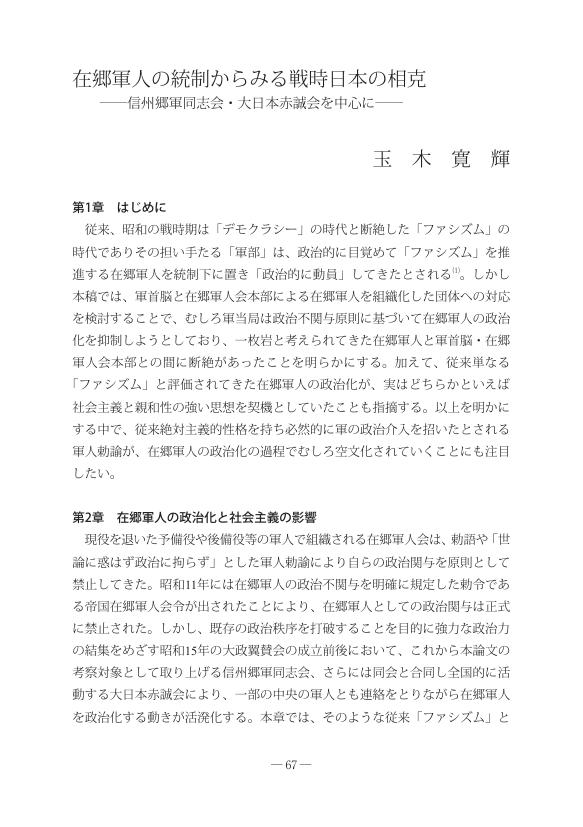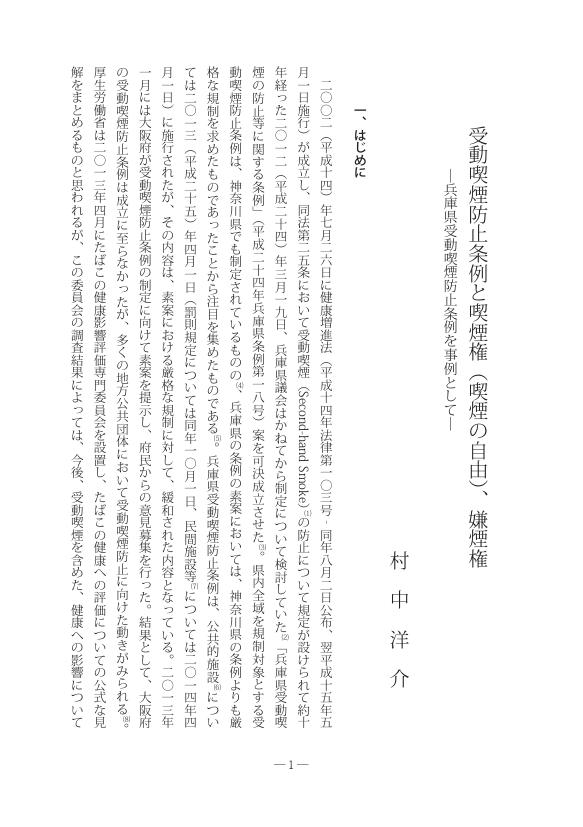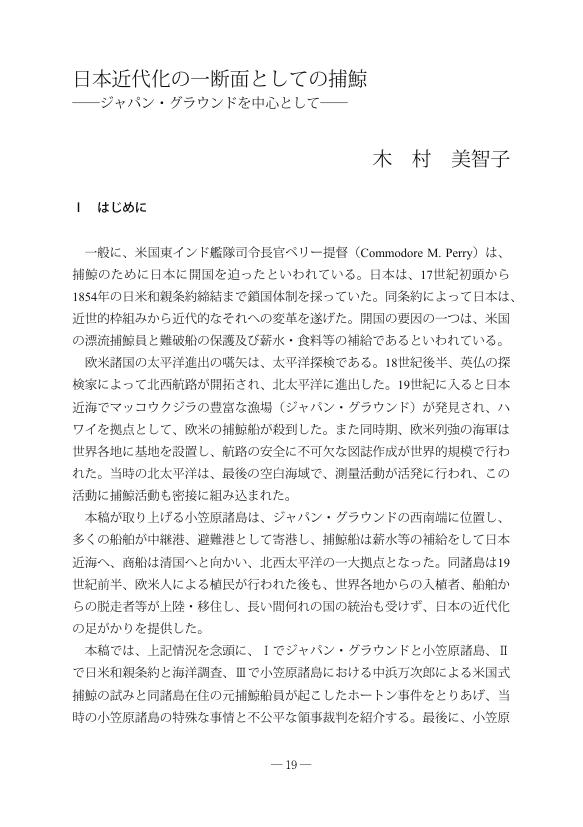2 0 0 0 ドイツにおける表現の自由 : 特に芸術の自由を中心として
- 著者
- 伊藤 公一
- 出版者
- 日本法政学会
- 雑誌
- 法政論叢 (ISSN:03865266)
- 巻号頁・発行日
- vol.8, pp.22-40, 1971
2 0 0 0 OA 在郷軍人の統制からみる戦時日本の相克
- 著者
- 玉木 寛輝
- 出版者
- 日本法政学会
- 雑誌
- 法政論叢 (ISSN:03865266)
- 巻号頁・発行日
- vol.51, no.1, pp.67, 2014 (Released:2017-11-01)
2 0 0 0 OA 集団に対する侮辱的表現 : ドイツの憲法判例を素材に
- 著者
- 上村 都
- 出版者
- 日本法政学会
- 雑誌
- 法政論叢 (ISSN:03865266)
- 巻号頁・発行日
- vol.36, no.1, pp.147-159, 1999-11-15 (Released:2017-11-01)
1 Fragestellung Die Frage, ob die Kollektivbeleidigung im allgemeinen und die sog. hate speech im besonderen zu verbieten ist, hat nicht nur auf volkerrechtlicher Ebene, sondern auch in der Staatsrechtswissenschaft Japans und anderer Staaten eine aktuelle Bedeutung. In diesem Beitrag ist darzulegen, dass die Bestrafung der Beleidigung von Kollektiven nur um des Schutzes der personlichen Ehre einzelner Gruppenangehoriger willen zu1assig ist und dass eine daruber hinausgehende Beschrankung der Meinungsfreiheit vetmieden werden soll. 2 Schutzbereich der Meinungsfreiheit Zuerst ist die Frage zu klaren, ob eine scharfe Kritik oder sogar eine beleidigende Ausserung unter den Schutzbereich der Meinungsfreiheit fallt. Nach der standigen Rechtsprechung des BVerfG besteht der Grundrechtsschutz unabhangig davon, ob die Ausserung rational oder emotional, begrundet oder grundlos ist und ob sie von anderen fur nutzlich oder schadlich, wertvoll oder wertlos gehalten wird. Im Auschwitzluge-Beschluss vom 13. 4. 1994 (BVerfGE 90, 241) hat das BVerfG die Verfassungsmassigkeit der behordlichen Auflage zwar zuerst wie folgt begrundet: Die in Frage stehende Ausserung soll aus dem Schutzbereich des Grundrechts nach Art. 5 Abs. 1 ausgeschlossen werden, well sie eine erwiesen falsche Tatsachenbehauptung darstellt. Das Gericht hat aberdaneben den zweiten Weg gezeigt, der davon ausgeht, dass auch die Auschwitzluge unter den grundrechtlichen Schutzbereich fallen kann, soweit sie als Meinungsausserung zur Erpressbarkeit deutscher Politik verstanden werden kann. Dogmatisch glatter und verallgemeinerungsfahiger ist der zweite Weg. Der erstere, der Ausschluss bestimmter Aussagen vom Schutzbereich der Meinungsfreiheit, kann zwar fur die Auschwitzluge zutreffen. Es fallt aber schwer, einen zweiten Anwendungsfall auch nur theoretisch zu finden. 3 Personliche Betroffenheit als Ausgangspunkt Die zweite Frage lautet: Was ist eigentlich das Rechtsgut, das durch das Verbot der Kollektivbeleidigung geschutzt werden soll? Die Ehre des Kollektivs als solches oder die des einzelnen Mitglieds? Nach dem "Soldaten sind Morder"-Beschluss vom 10. 10. 1995(BVerfGE 93, 266) soll es die "personliche" Ehre der einzelnen Gruppenangehorigen sein. Die personliche Betroffenheit ist nach dem BVerfG dann anzunehmen, wenn es sich um eine abgrenzbare und iiberschaubare Gruppe handelt und die herabsetzende Ausserung an ein Merkmal anknupft, das bei allen Angehorigen des Kollektivs vorliegt, und wenn die angenommene Gruppe nicht uniiberschaubar gross ist(wie: alle Katholiken oder alle Protestanten, alle Gewerkschaftsmitglieder, alle Frauen). 4 Giiterabwlgung Drittens ist die Frage zu klaren, wie die beiden kollidierenden Grundrechtsguter abgewogen werden sollen. Das BVerfG entwickelte schon im Luth-Urteil vom 15. 1. 1958(BVerfGE 7, 198) die sog. "Wechselwirkungslehre". Sie verlangt, dass die Grundrechtsschranke in ihrer das Grundrecht beschrankenden Wirkung ihrerseits im Lichte der Bedeutung dieses Grundrechts gesehen und so interpretiert werden muss, dass der besondere Wertgehalt des eingeschrankten Rechts auf jeden Fall gewahrl bleibt. Als deren Konkretisierung gelten nach der Rechtsprechung die "Vermutungsformel" und die "Vorrangformel". Die erstere lautet: wenn es sich bei der umstrittenen Ausserung um einem Beitrag zuv offentlichen Meinungsbildung oder zu einer die Offentlichkeit wesentlich beruhrenden Frage handelt,so spricht eine Vermutung zugunsten der Freiheit der Rede. Die letztere gilt dagegen fur die herabsetzenden Ausserungen, die entweder die Menschenwurde eines anderen antasten oder sich als Formalbeleidigung oder Schmahung darstellen. In diesem Fall soll die Meinungsfreiheit regelmassig hinter den Ehrenschutz zurucktreten. Im Falle der Kollektivbezeichnung gilt noch eine weitere Vermutung: wenn eine Personengruppe durch eine bestimmte soziale Funktion geeint ist, lasst(View PDF for the rest of the abstract.)
2 0 0 0 OA 受動喫煙防止条例と喫煙権(喫煙の自由)、嫌煙権
- 著者
- 村中 洋介
- 出版者
- 日本法政学会
- 雑誌
- 法政論叢 (ISSN:03865266)
- 巻号頁・発行日
- vol.50, no.1, pp.1, 2013 (Released:2017-11-01)
2 0 0 0 OA 人工妊娠中絶の法規制
- 著者
- 贄 育子
- 出版者
- 日本法政学会
- 雑誌
- 法政論叢 (ISSN:03865266)
- 巻号頁・発行日
- vol.52, no.2, pp.95, 2016 (Released:2017-11-01)
2 0 0 0 OA 精神看護学領域における問題提起:精神科医療制度の現状と課題─看護の現場から─
- 著者
- 小林 純子
- 出版者
- 日本法政学会
- 雑誌
- 法政論叢 (ISSN:03865266)
- 巻号頁・発行日
- vol.52, no.2, pp.231, 2016 (Released:2017-11-01)
2 0 0 0 OA 韓国:政治代表の男女不平等を是正するためのクォータ制度
- 著者
- 大澤 貴美子
- 出版者
- 日本法政学会
- 雑誌
- 法政論叢 (ISSN:03865266)
- 巻号頁・発行日
- vol.52, no.2, pp.203, 2016 (Released:2017-11-01)
2 0 0 0 OA 国家賠償法第一条について : 登記官の過失
- 著者
- 貝田 守
- 出版者
- 日本法政学会
- 雑誌
- 法政論叢 (ISSN:03865266)
- 巻号頁・発行日
- vol.23, pp.128-134, 1987-05-20 (Released:2017-11-01)
In diese Abhandlung will Ich den Sinn von "Fehler" in §1 des Gesetz der Staatsersatzhaftung mit Rucksicht auf den Fehler begang der Grundbuchbeamte erlautern. Bei der Eintragung, gibt es viele sehr geschickten Verfalschung mit der entwickelnden Kopie-Technik, und handert es sich damit Massnahme des Grundbuchbeamte. Denn uberprufe ich das, dass ist der Fehler mere Fahrlassigkeit.
2 0 0 0 OA 教育法・学的システム・当事者参画
- 著者
- 福永 英雄
- 出版者
- 日本法政学会
- 雑誌
- 法政論叢 (ISSN:03865266)
- 巻号頁・発行日
- vol.42, no.1, pp.1-14, 2005-11-15
Though the whole picture of the paper cannot be described here in this summary, the following points can be the keys to the problematics of the theme. So-called educational reforms have been transmitted down one after another in recent years. But the actors concerned themselves have seldom been able to participate in the policy-making processes. To maintain the autonomy of school education, we have to know the following mechanism. Firstly, the educational-academic system differs from, for example, the political system or the economic system. They have each different code. If we continually introduce the codes of the political system and the economic system into the educational-academic system, the educational-academic system will become another system. Secondly, independence of system has priority over other things, I insist. Without independence of the educational-academic system, academic freedom and the autonomy of school education will not function well. Thirdly, teachers can be more responsible for school education through deliberation-determination-substantiation in staff meetings. But 'school conferences' may have some possibility of being more public. At the foot of the paper, the prerequisite for 'sovereignty of actors concerned' will be mentioned briefly.
- 著者
- 大森 義夫
- 出版者
- 日本法政学会
- 雑誌
- 法政論叢 (ISSN:03865266)
- 巻号頁・発行日
- vol.52, no.1, pp.209-218, 2016-02-25
It is a serious defect that the Constitution of Japan lacks the provisions responding to emergency situations from the viewpoint of national function. Such provisions are indispensable for not only dealing with national security issues but also controlling the large-scale natural disasters which are currently frequent. Therefore, it is necessary for the Cabinet or the Prime Minister to be authorized to impose a state of emergency. Although a crisis management system has practically and legislatively been established and improved in recent years in Japan, the problem relating to a creation of the authentic and authoritative intelligence unit remains. This is an urgent issue. In this paper, I will consider the social and historical conditions and background surrounding the establishment of such an intelligence unit in Japan.
- 著者
- 小林 伸一
- 出版者
- 日本法政学会
- 雑誌
- 法政論叢 (ISSN:03865266)
- 巻号頁・発行日
- vol.42, no.2, pp.98-131, 2006-05-15
There is a large academic literature on overall values served by the First Amendment, U.S. Const. Amendment. I is Free Speech and Press Glaus e. The marketplace, self-government and autonomy are most frequently invoked. Principle-based theories on First Amendment theory argue these values as basis for justifications for the special protection afforded freedom of expression. Each of these theories makes some claim to provide a foundational basis for the First Amendment. Recently, The Supreme Court gives some measure of protection to hate speech as cross-burning and organizational forms and activities having expressed their antihomosexual views. Do any of the principle-based theories apply to cross-burning or activity to a discriminate homosexual conduct? Do these activities subserve the values that hold up in those theoies? Taking this opportunity, Non principle-based theories come to the front. This article traces comparatively three representative theorists in the non principle-based theory. The following assertions are presented by them. Stanly Fish exhibits perspectives from literary theory applied to First Amendment jurisprundence. He insists that any theory of free speech must reflect a substantive political content. Thus, the abstraction at the center of First Amendment jurisprudence- marketplace, self-government, autonomy-do not in themselves point us to the appropriate distinctions. Richard Posner has his root in "Law and Economics". And his philosophy is pragmatism. Posner argues that because the legal concept of freedom of speech is plastic, mutable, and contestable it may appropriately take its shape from the practical considerations the instrumental approach bring into view. He employs cost-benefit analysis to explore when government can regulate expression which has a public good. Frederick Schauer relies on analytic philosophy modified by traditional common law theories. He claims the importance of seeing rules as crude probablistic generalizations. And Schauer distinguishes between conversational and entrenchment models of generalization, but he doesn't grasp each models as an exclusional reason. He argues that the legal system takes freedom of speech as a given, devoting little if any attention to the philosophical foundation of the principle it seeks to enforce. Schauer focuses on less various values served by the First Amendment than on the special reason to distruct government in the realm of speech regulation.
2 0 0 0 OA 感情と政治
- 著者
- 茨木 正治
- 出版者
- 日本法政学会
- 雑誌
- 法政論叢 (ISSN:03865266)
- 巻号頁・発行日
- vol.44, no.2, pp.93-111, 2008-05-15
This essay is intended to investigate the relationship between politics and emotions in terms of the role that mass media takes in activating emotions in public. Reviewing the studies on politics and emotion and on emotions in mass media, there were some useful insights to me in conducting my research. Recent investigations in emotion and politics have demonstrated that emotion is considered to have priority over reason in politics. The major result from recent studies on mass media and emotion has been that media framing is available to analyze the evocative function of mass media to politics on the micro level as much as media event research is on the macro level.
- 著者
- 重村 博美
- 出版者
- 日本法政学会
- 雑誌
- 法政論叢 (ISSN:03865266)
- 巻号頁・発行日
- vol.59, no.1, pp.7, 2023 (Released:2023-12-15)
1 0 0 0 OA 日本近代化の一断面としての捕鯨 ─ジャパン・グラウンドを中心として─
- 著者
- 木村 美智子
- 出版者
- 日本法政学会
- 雑誌
- 法政論叢 (ISSN:03865266)
- 巻号頁・発行日
- vol.54, no.1, pp.19, 2018 (Released:2018-07-14)
1 0 0 0 OA 家庭内における性的虐待への対応策の検討 ―刑事政策的側面から―
- 著者
- 西山 智之
- 出版者
- 日本法政学会
- 雑誌
- 法政論叢 (ISSN:03865266)
- 巻号頁・発行日
- vol.58, no.2, pp.171, 2023 (Released:2023-04-25)
1 0 0 0 OA 【特別講演】「日本法政学会と私」
- 出版者
- 日本法政学会
- 雑誌
- 法政論叢 (ISSN:03865266)
- 巻号頁・発行日
- vol.49, no.2, pp.172, 2013 (Released:2017-11-01)
1 0 0 0 OA 海上公安局法の廃止までの政治過程 ─戦後の海軍再建構想と自衛隊の創設に関連して─
- 著者
- 亀田 晃尚
- 出版者
- 日本法政学会
- 雑誌
- 法政論叢 (ISSN:03865266)
- 巻号頁・発行日
- vol.58, no.2, pp.49, 2023 (Released:2023-04-25)
1 0 0 0 OA 合法な逮捕に伴うスマートフォンの無令状捜索に関する憲法学的考察
- 著者
- 辻 雄一郎
- 出版者
- 日本法政学会
- 雑誌
- 法政論叢 (ISSN:03865266)
- 巻号頁・発行日
- vol.51, no.2, pp.111-130, 2015-08-15 (Released:2017-11-01)
The Fourth Amendment was added to the U.S. Constitution in 1791. In no place in the Fourth Amendment does the term "warrant" appear. In interpretation of the Fourth Amendment by the U.S. Supreme Court, the police require warrants to perform searches. A warrantless search is deemed reasonable only if it falls within a specific exception to the Fourth Amendment's warrant requirement. The ninety percent of American adults who own cellphones todays carry with them digital records of nearly every aspect of their lives. Two hundred and twenty-three years have passed since the Fourth Amendment was added. In Riley v. California, the Supreme Court held that the police generally have no authorization to search digital information on cellphones seized from arrested individuals without warrants. While the Riley case is certain to be a subject further study, the American scholars who have studied the case so far have found several lessons for the interpretation of constitutional law. In this article, I would like to discuss this issue with a focus on the interpretation methods of the originalist Justice Scalia and the intra-textualist Akhil Amar, and the battle between Congress and the judicial approach. Justice Breyer provided six factors to overturn precedents. Daniel Farber shows a pragmatic approach.
1 0 0 0 OA 研究・調査における学者の倫理
- 著者
- 谷岡 一郎
- 出版者
- 日本法政学会
- 雑誌
- 法政論叢 (ISSN:03865266)
- 巻号頁・発行日
- vol.53, no.2, pp.205, 2017 (Released:2017-11-01)
1 0 0 0 OA 児童虐待に対する刑事法の新たな役割
- 著者
- 三枝 有
- 出版者
- 日本法政学会
- 雑誌
- 法政論叢 (ISSN:03865266)
- 巻号頁・発行日
- vol.40, no.1, pp.66-78, 2003-11-05 (Released:2017-11-01)
The act of child abuse is often performed by the protector of the abused child under the veil of "discipline", so the abuser does not have the strong sense of guilt, nor is the abused conscious of the fact that he or she is the target of a crime. That is why child abuse is called "a hidden crime". Most of the acts of child abuse are performed behind closed doors and continue for a certain period of time. In most cases such acts are not discovered by an outsider easily. Moreover the act of child abuse is performed between the special relationship such as the relationship of a parent and a child, so that it is difficult for the abused children to recognize themselves as a victim and the children tend to be resigned to their situation. Not only that, the abused children often form the sense of guilt because they feel they are also responsible for such an act. In 1961 C.H. Kempe advocated "the Battered-Child Syndrome" concerning the actual conditions of child abuse which has the special characteristic of a hidden crime. Nearly 40 years later, finally in Japan, "the Law concerning the Prevention and Others of Child Abuse (the Child Abuse Prevention Law)" was passed and effected at the plenary session of the House of Representatives on May 17, 2000. Since the enforcement of the Law, the number of acknowledged cases of child abuse and the number of arrests have been increasing rapidly, so it is true that the very enactment of the Law has promoted the notifications of child abuse cases and the arrests of abusers. It is also true that in the Japanese society where Confucian ideas still remain in people's mind, like in Korea, child abuse by its own parent was a taboo which we should not talk about or even think about. However, realities were opposite. In this paper, I will discuss the role that criminal punishment should play to prevent child abuse, while grasping the actual conditions of child abuse today and the Japanese ideas that have led to such conditions. As a conclusion I would like to propose the active introduction of punitive provisions of the laws by demonstrating that conventional punishment which emphasizes its function of sanction should emphasize its function of forming the new sense of norms in child abuse and furthermore that punishment should actively perform its supplementary function to facilitate welfare-oriented intervention by the government going beyond its general preventive function. Contents 1. Introduction-Actual Conditions of Child Abuse 2. The Abuse Prevention Law and Punishment 3. The Role of the Criminal Law in Child Abuse 4. Conclusion-the New Function of the Criminal Law













